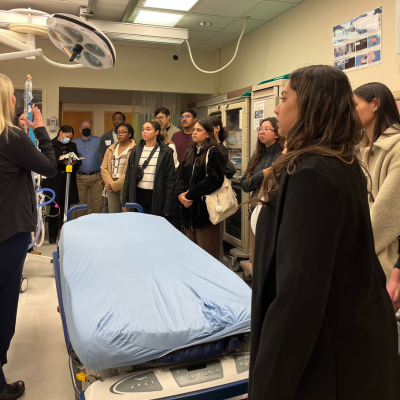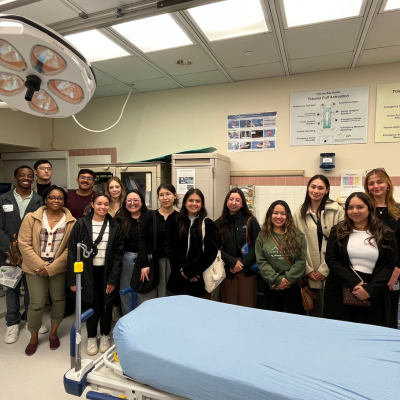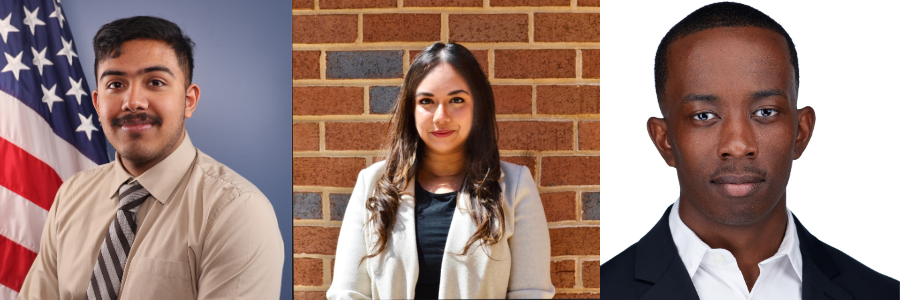Aspiring health care leaders get vivid lesson on the role of leadership in trauma care
Students in George Mason University’s Master of Health Administration (MHA) program recently had an unforgettable opportunity to step into the heart of one of Northern Virginia’s premier emergency care facilities. MHA students from change management and strategic planning classes class visited Inova Fairfax Hospital’s state-of-the-art trauma center, gaining firsthand insight into how top-tier health care organizations operate at the intersection of clinical urgency and administrative excellence.

Photo by Michelle Thompson/College of Public Health
This visit was much more than a tour—it was a vivid demonstration of how George Mason’s MHA program prepares future leaders for complex, high-stakes environments. The experience underscored three key themes: the transformative education George Mason provides, the powerful partnership with Inova Health System, and the inspiring potential of George Mason’s future health care leaders.
Translating classroom learning to real-world practice
For Vinay Bhakthan, who will graduate in spring 2026 from the Bachelor’s to Accelerated Master’s program, the visit was eye-opening. “From coordinating nurse staffing levels and ensuring patient bed availability, to triaging critical cases to trauma rooms and overseeing room turnover after discharges, all while making sure the emergency department is following all regulations and organization policies is an immense task. Seeing these things in person gave me a clear perspective about the realities of the job,” said Bhakthan.
Similarly, Pratyusha Satpathy, who will graduate in December 2026, found herself connecting academic concepts to operational excellence. “This visit brought many classroom concepts to life,” she said. “It also reminded me how essential leadership is in shaping an environment where clinicians can focus on patients while everything else runs smoothly in the background. Everything was thoughtfully planned out—from how easily accessible supplies were, to how rooms could transition into emergency pods instantly with oxygen and suction systems already in place. It really showed how administrators are not only managing systems but enabling life-saving care through intentional design and coordination.”
For Taveion Mickens, the visit bridged his growing academic knowledge with the emotional reality of health care leadership. Mickens, a United States Marine, will graduate from the Bachelor’s to Accelerated Master’s program in December 2026. “Seeing administrators lead with both precision and empathy reinforced how indispensable they are in creating an environment where health care professionals can thrive and patients can receive timely, quality care. Emergencies don’t follow a script leaders must be able to pivot quickly and make informed decisions under pressure. Communication becomes a lifeline, not just between staff, but also with patients and families who may be in crisis. Most importantly, empathy must guide every decision. When administrators lead with compassion, they uplift both their teams and the patients they serve,” said Mickens.
A strong partnership with Inova Health System

Photo by Michelle Thompson/College of Public Health
The tour also spotlights George Mason’s longstanding relationship with Inova. Through access to real-world settings like Inova Fairfax’s trauma center, George Mason students experience how leading health care organizations integrate systems thinking, workforce management, quality assurance, and emergency preparedness into seamless patient care.
“As a former trauma nurse, I know the value of exposing graduate students to the world of health care beyond the walls of a classroom and textbooks. My hope is that students who seek an MHA degree will become leaders that are consistently engaged with clinicians and staff as patient care partners, rather than detached bystanders. There is simply no substitute for being present,” said Professor Brenda Helen Sheingold, PhD, RN, FNAP said division director of Health Administration Programs and an associate professor in the Department of Health Administration and Policy.
The Inova trauma center’s forward-thinking infrastructure—emergency pods, integrated technology systems, and strategically organized resources—left a lasting impression on the students. It demonstrated how thoughtful administrative planning directly enhances clinical outcomes and staff resilience, particularly in high-pressure emergency environments.
Inspiring the next generation of health care leaders
Each of the three students came away with renewed passion and clarity for their future careers. Bhakthan, who is motivated by the desire to solve health care’s systemic challenges, affirmed that the visit “strengthened [his] commitment to being part of the solutions” in health care administration.
Satpathy, who blends a clinical background as a doctor with administrative aspirations, left the visit feeling more empowered: “As someone who trained in medicine before coming to the U.S... I want to build environments that make health care safer, smoother, and more responsive.”
For Mickens, whose goal is to lead change in underserved communities, the experience provided both affirmation and inspiration. “This visit didn’t just confirm my career goals; it gave them new direction and deeper purpose,” he said.
Thanks to the immersive experiences provided through the College of Public Health’s MHA program—and strong partners like Inova Health System—students are graduating ready to lead the future of health care, not just react to it. For these aspiring health care leaders, the trauma center visit wasn’t just an assignment. It was a vivid reminder of the critical role administrators play in ensuring every life-saving second counts.

From left, MHA students Vinay Bhakthan, Pratyusha Satpathy, Taveion Mickens
Students Experience the Pitt—A Real-World Trauma Center
For fans of the hit medical drama The Pitt on Max, the high-stakes, fast-paced world of trauma care is both riveting and emotionally charged. But for three George Mason University Master of Health Administration (MHA) students, a recent visit to Inova Fairfax Hospital’s Trauma Center offered a firsthand look at the real-life complexities behind the scenes—where administrators play a crucial role in orchestrating life-saving care.
Inova Fairfax Hospital houses Northern Virginia’s only Level 1 Trauma Center, a designation it has held since 1983. This elite status signifies the hospital's ability to provide the highest level of surgical care to trauma patients, with a multidisciplinary team available 24/7. The center treats a wide range of critical injuries, from car crashes and falls to industrial incidents and acts of violence.
For MHA students Vinay Bhakthan, Pratyusha Satpathy, and Taveion Mickens, the visit to Inova's Trauma Center was more than an educational tour—it was a transformative experience that bridged classroom learning with real-world application.
